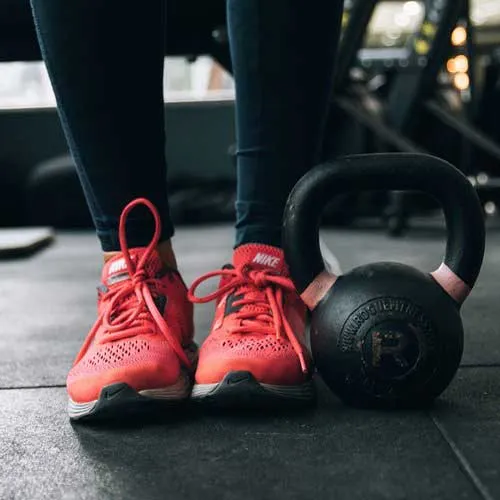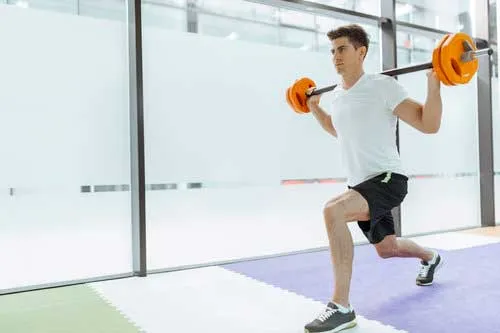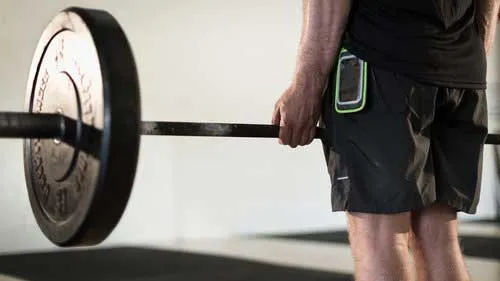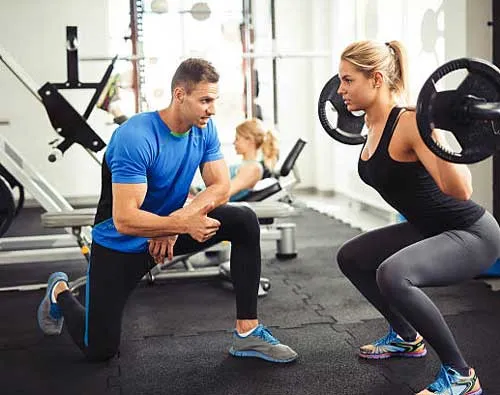Runners have so much to gain by strength training. The research has strongly demonstrated that there are profound benefits to runners who train with resistance exercise. Here are some of the benefits that have been observed
regularly in the research:
Improved running economy/efficiency
Reduced or delayed fatigue
Improved anaerobic capacity
Reduced risk for injury
Improved maximal speed
Maybe you’re hearing this for the first time or maybe you’ve already dabbled in strength training. The truth is that strength training can be intimidating at first, but is extremely rewarding and pays dividends to your running
performance. If you’re stuck in a running rut, or a cycle of injuries, focusing on strength training for a few weeks could break you through to the other side.
WHY DON’T MORE RUNNERS LIFT WEIGHTS?
CIRCULATING MISINFORMATION

Strength training for runners is kind of like taboo. There are more people that are aware of reasons why it might be “bad” for runners than people who know the truth. A lot of this may be due to the majority of runners not ever
participating in anything other than recreational running. I like to assume that the majority of formal high-school and collegiate running teams are being coached to train at least part of the year in the weight room. But many of us
never participated in formal running athletics, or we did and forgot the importance or why we ever weight-trained for running in the first place.
There’s a slew of misinformation out there about strength training for runners. I often hear things like:
“Weight-training will slow you down.”
“Weight-training will make you gain weight and get bulky.”
“Runners can’t get strong because their bodies aren’t made for it.”
“Runners can’t get strong because they run too much.”
“Training with weights can lead to injury.”
The reality is, these statements just aren’t true.

The research is clear that runners DON’T gain weight, slow down, get bulky, or increase their injury-rate from strength training and runners do in fact get stronger. Runners usually just want to run, or at least believe that the
only way to become a better runner is to run farther and faster. If accepting these statements as truth fosters that behavior, then most runners are okay with it, at least subconsciously. Lastly, not that we should be comparing
ourselves to the elites… but some of the top endurance athletes in the world are dead-lifting and squatting 2-3 times their body-weight.
SOCIAL BARRIERS

When we look around town, while running, or even driving, we see a lot of runners, especially here in Fort Collins, Colorado. It seems like everyone is out running! It’s easy to see people running around town, but what you don’t see
is everything else this runner may, or may not be doing to better their running… like going to the gym for example. Another example is that we also see a lot of runners stretching, which may lead some people to believe that
stretching is necessary for running… but it’s not (see my last blog about stretching and running). People are usually very influenced by their peers. People see, and people do.
But people don’t necessarily know why they need to do something, or why it might not be beneficial to them.
Running is a very social sport, especially distance running. We head out with friends or a group and we socialize. It’s fun, engaging, and an easy way to make friends. Strength training can be social too, but it’s usually not. Going
to the gym, putting your head down and lifting weights doesn’t typically foster deep conversation. This might turn some people off. People are more likely to invite a friend on a run, but not necessarily to their weight-lifting
workout (although they should!). These social barriers make it even harder for a runner to finally decide they need to start strength training. Although one way to use your friends to your advantage, is to ask them to join you for a
8-12 week strengthening program. Make it competitive but fun, and do it together!
MOST RUNNERS JUST DON’T KNOW HOW TO LIFT

Even if someone is convinced they need to strength train to improve their running, they might not know how. In my experience, a lot of runners I’ve worked with have done minimal if any strength training before. This can be very
intimidating and frustrating for someone. Strength training exercises should be done with good technique and a lot of people simply don’t know what that means. Squats, dead-lifts, split-squats, using kettle bells, dumbbells, bands…
it’s a little overwhelming if you’ve never touched most of that equipment before. Not to mention, a lot of runners are pretty uncoordinated at first, making some exercises very difficult to perform. Running is one of few sports
where you can get away with being fairly uncoordinated for a period of time (before it catches up with you). Strength training also requires the knowledge of “how much”, “how hard”, “how much rest”, and “for how long”, a lot of
which runners also don’t know at first.
HOW TO GET STARTED WITH STRENGTH TRAINING
How should the average runner get started with strength training? It can be as simple as starting with body weight exercises. This is usually what I recommend to runners who have little to no experience with strength training.
Starting with
lunges, body weight squats,
single-leg squats,
single-leg dead-lifts,
bridges, and
planks are all excellent exercises to start with and offer significant challenge for a beginner or someone who can’t make it to the gym. Aim for 2 days per week, 3 sets of 8-10 repetitions per exercise. Shoot for
2 days per week of strengthening. In the beginning you might be pretty sore, but with consistency this should lessen after each workout, although being a little sore is a good thing; it’s a sign that we’ve challenged the muscle
enough to get stronger. Strength improvements happen quickly at first and these exercises needs to be constantly modified in order to achieve the amount of load necessary for our muscles to adapt. Eventually you will have no other
option than to start adding weight!

If you want to take strength training seriously (as you should) but aren’t exactly sure how, please reach out and we can chat about how we can create a specific strength training program specifically for you. I can walk you through
how to do each exercise and how to progress it. Or, if you just want to start with something less committing, I have created a FREE online introductory program for runners to start strength training (see below).
FILL OUT THE FORM BELOW TO ACCESS THIS FREE VIDEO SERIES.



